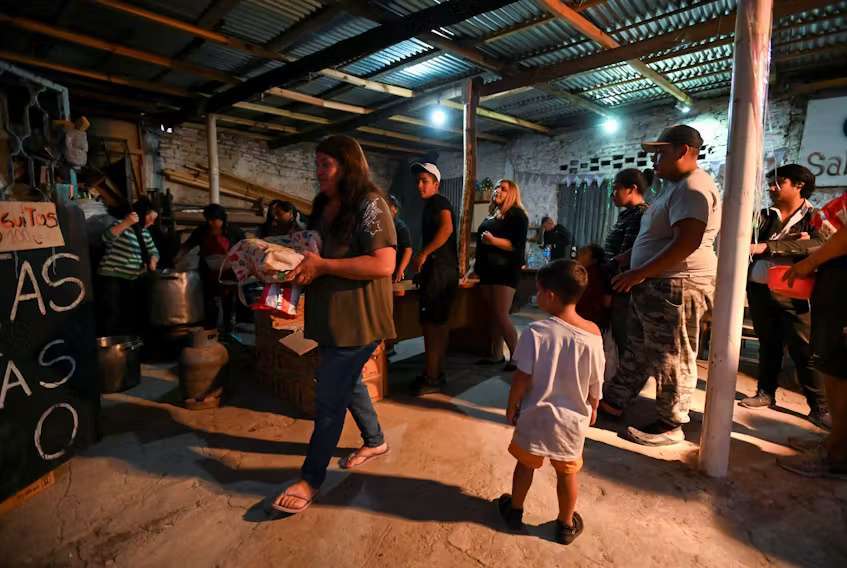The cooks at an Argentine soup kitchen are concerned that their meager supply of pasta will not be sufficient to fill the empty plastic containers left by hungry guests.
Carina López, 50, is the manager of ‘Las hormiguitas viajeras’, a community dining hall in Loma Hermosa, a disadvantaged neighborhood in San Martín, north of Buenos Aires. “I don’t know if we will make it today,” she worries.
She gestures to empty crates that would typically hold produce.
Those who come in for a cooked lunch today will only get a little piece of pork and plain noodles.
Meal centers such as this one are confronted with two crises: the increase in the number of hungry people to feed during a recession and the decision by President Javier Milei’s new administration to stop providing aid.
In November, the government of Argentina provided food to tens of thousands of these community organizations, just prior to Milei’s inauguration. Milei is a far-right libertarian who describes himself as a “anarcho-capitalist”.
In order to establish a system of direct help, Milei’s administration claims to examine the needs of each soup kitchen individually, omitting middlemen like social movements that he refers to as “poverty managers.”
“A novel approach will be employed to ensure that aid reaches its intended destination,” stated Manuel Adorni, the Presidential Spokesman for Milei.
The soup kitchens, which usually serve over 100 servings daily, have been fighting for months to subsist on donations and minimal municipal assistance before receiving this innovation.
According to López, she received orders from the authorities to either shorten the hours of the soup kitchen or expel patrons.
But I’m not allowed to expel anyone. There are newcomers. fresh senior citizens. I cannot comprehend the circumstances.
After decades of economic mismanagement, nearly half of Argentina today lives in poverty and confronts yearly inflation of over 250 percent.
After being swept to victory in November of last year, Milei has promised a difficult transition and started cutting back on spending drastically. In order to further hurt the impoverished, he also began his term by slashing state subsidies for transportation and fuel and depreciating the long-overvalued peso by more than 50%.
Daniel Barreto, a 33-year-old bricklayer, is among the recent attendees of the San Martín soup kitchen. Like many others, he is having difficulty finding contract employment, since numerous building sites are at a standstill due to the government’s decision to suspend new public works projects.
In the meantime, the economic crisis is causing private enterprises to reduce recruiting.
Even yet, inflation eats away at the wages Barreto manages to scrounge together.
No matter how hard I work or don’t work, the money is insufficient. He said, “I have four kids and a wife.” I cannot comprehend the circumstances.
The social movements that oversee the soup kitchens claim that at least 50% more people are using them now. The kitchens were started out of a strong sense of community.
The United States confiscates Venezuela’s “Iranian” jet after 20 months at Ezeiza
Continue reading…
The United States confiscates Venezuela’s “Iranian” jet after 20 months at Ezeiza
“And that has only just started,” stated Melissa Cáceres, a registered member of the Libres del Sur group and a member of a local group in charge of organizing the soup kitchen.
To avoid being noticed, families frequently send a child to pick up some food.
38,000 “community dining halls” can be found in Argentina, according to Celeste Ortiz, a spokesman for the social movement Barrios de Pie.
The bishops’ conference in Argentina demanded in February that “all spaces which give food… to receive help without delay.”
When Human Capital Minister Sandra Pettovello told social movements protesting the absence of food aid last week that anyone who was hungry should come “one by one” to see her, hundreds of people lined up for 30 blocks.
She didn’t venture outside to greet them.
A union leader is suing Pettovello right now because her Ministry neglected to provide meals.
The government has doubled the value of food vouchers distributed to families in an effort to demonstrate that Milei’s widespread economic deregulation will not harm the most disadvantaged.
Recently, Pettovello closed aid agreements with evangelical churches and the Catholic charity Caritas for over half a million dollars.
Caritas, on the other hand, has denounced the government’s selective aid, stating that “partisan opinions, ideological prejudices, and sectoral struggles cannot be tolerated in a country where poverty is increasing.”
Despite her gratitude for the Church’s assistance, Cáceres expresses concern that “some intermediaries seem worthwhile and others are not.”
Stretching their rations to feed everyone who needed it for another day, the cooks in the soup kitchen at San Martín let out a sigh of relief as the war goes on.
With a sigh of relief, Carina López reports that everyone got a full lunch and that 130 meals were distributed in the dining hall.

